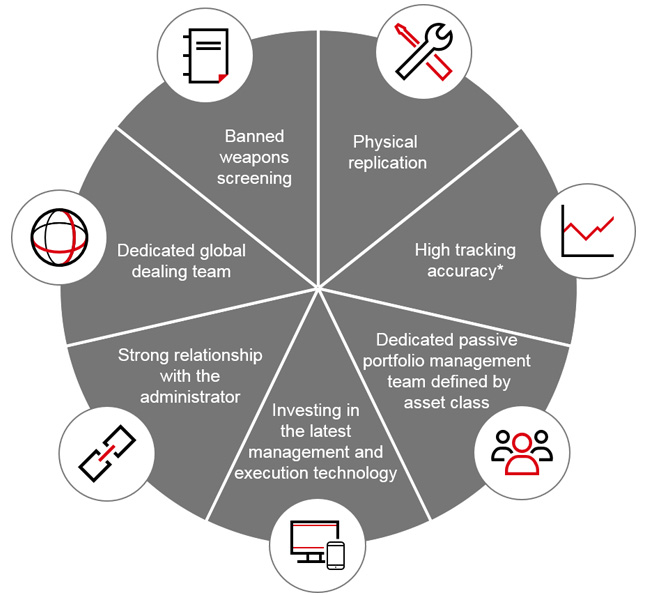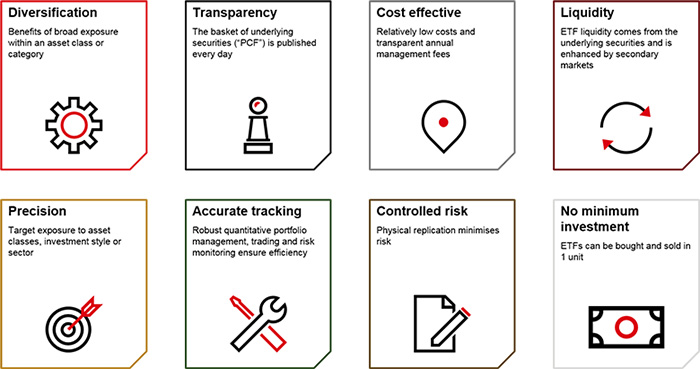ETFs
HSBC Hang Seng TECH UCITS ETF
We take a pragmatic approach to managing ETFs for our clients, with two equally important objectives: tracking the index closely and minimising costs. Our ETFs offer investors an exposure to a wide range of global, regional and single-country indices.
Key benefits of our ETF range
Our investment process aims to efficiently track an index as close as possible. We have a proven track record in providing competitively priced ETF solutions. Our range is supported by the following key benefits:

Physical replication
Our ETFs only invest in the physical stocks which make up the index, also known as ‘physical replication’, and we do not use complicated financial instruments to track the indices.
High index tracking accuracy*
Our experience in managing index funds, means we are able to utilise different implementation techniques and add value where appropriate to ensure our solutions efficiently track the index – while minimising the costs for our clients.
*Please refer to the factsheets for individual fund performance
Enhanced risk management, control and monitoring
As a bank owned asset manager, we are subject to more robust risk parameters and stricter governance rules. Risk management is central to our investment process before, during and after investment decisions are made.
Dedicated global dealing team
At HSBC we have traders located in key regional execution hubs. This means we are able to reduce the high costs normally associated with trading stocks which affect the performance of funds.
Banned weapons stock screening
At HSBC, doing the right things is important to us, we have therefore taken a firm wide ban of investing in companies which produce ‘banned weapons’ as defined by the UN (i.e. chemical weapons and anti-personnel mines).
Large investment in the latest management and execution technology
We have been investing in in-house leading technology to ensure our solutions can benefit from the latest IT developments aimed at delivering cost savings and better performance for our funds and ultimately, for investors.
How to trade our ETFs
To invest in HSBC Asset Management ETFs, please contact your local stockbroker.
Authorised Participants and Market Making contact list
Bank of America Merrill Lynch
Jessica Lana / David Thompson
Email: DG.Delta_One_Trading_Europe@BAML.com
BNP Paribas Arbitrage SNC
Aurelien Cristini
Email: aurelien.cristini@bnpparibas.com
Bluefin Europe LLP
Simon McGhee
Email: europe@bluefintrading.com
Citigroup Global Markets
Andrew J. Jamieson
Email: europe.etf.trading@citi.com
DRW Global Markets Ltd/DRW Europe BV
Bernardus Roelofs
Email: gd1-trading@drw.com
Flow Traders B.V.
Christian Oetterich / Chris Meyers
Email: traders.amsterdam@nl.flowtraders.com
GHCO
Levon Piruzyan
Email: etf@ghco.co.uk
Goldman Sachs International
Rockey Agarwal
Email: Gsetfs@gs.com
HSBC Global Markets
Steve Palmer / Luke Rose
Email: etftradingdesk@hsbcib.com
Jane Street Financial
Slawomir Rzeszotko / Chris Foxon
Email: europe-etfs@janestreet.com
Morgan Stanley
Oliver Morgan
Email: europeanetf@morganstanley.com
Optiver VOF
Holger Schluenzen
Email: ETF@optiver.com
RBC Capital Markets
Matt Holden
Email: euetftrading@rbccm.com
Société Générale SA
Martina Schroettle
Email: europe.etf@sgcib.com
Susquehanna Europe
Salvatore Accurso / Marco Salaorno / Damon Walvoord
Email: etfsaleseurope@sig.com
Virtu Financial
Liam Emery
Email: euetf-trading@virtu.com
Official Market Makers:
Société Générale SA
Martina Schroettle
Email: europe.etf@sgcib.com
GHCO
Levon Piruzyan
Email: etf@ghco.co.uk
For further information, please contact HSBC directly:
HSBC ETFs Capital Market Team
E-mail: etfcapmarkets@hsbc.com
Valentina Riva
Phone: +44 (0)20 3359 5698
E-mail: valentina.riva@hsbc.com
Securities Lending Programme
From 1 March 2021, HSBC Asset Management will operate a securities lending programme for the benefit of ETF fund investors. Securities lending is a practice within capital markets whereby a holder of a security, such as an ETF, temporarily lends some of its securities out to a borrower in exchange for collateral and a fee. It is a well-established process within the investment management industry used to enhance fund performance through additional income earned.
The value of investments and any income from them can go down as well as up and investors may not get back the amount originally invested. For more detailed information on how the programme affects a specific ETF, please visit the Fund Centre and refer to the Securities Lending Programme within the Documents section.
Key risks and important information
The value of investments and any income from them can go down as well as up and investors may not get back the amount originally invested.
Key risks
The value of investments and any income from them can go down as well as up and investors may not get back the amount originally invested.
- Exchange Rate risk: Investing in assets denominated in a currency other than that of the investor’s own currency perspective exposes the value of the investment to exchange rate fluctuations.
- Derivative risk: The value of derivative contracts is dependent upon the performance of an underlying asset. A small movement in the value of the underlying can cause a large movement in the value of the derivative. Unlike exchange traded derivatives, over-the-counter (OTC) derivatives have credit risk associated with the counterparty or institution facilitating the trade.
- Index Tracking risk: The performance of the Fund may not match the performance of the index it tracks because of fees and expenses, market opening times and regulatory constraints.
- Operational risk: The main risks are related to systems and process failures. Investment processes are overseen by independent risk functions which are subject to independent audit and supervised by regulators.
- Liquidity risk: Liquidity is a measure of how easily an investment can be converted to cash without a loss of capital and/or income in the process. The value of assets may be significantly impacted by liquidity risk during adverse market conditions.
- Emerging Market risk: Emerging economies typically exhibit higher levels of investment risk. Markets are not always well regulated or efficient and investments can be affected by reduced liquidity.
- Focused Strategy risk: Funds with a narrow or concentrated investment strategy may experience higher risk and return volatility and lower liquidity than funds with a more diversified approach.
Important information
The HSBC ETF range are sub-funds of HSBC ETFs plc (“the Company”), an investment company with variable capital and segregated liability between sub-funds, incorporated in Ireland as a public limited company, and is authorised by the Central Bank of Ireland. The company is constituted as an umbrella fund, with segregated liability between sub-funds.
Shares purchased on the secondary market cannot usually be sold directly back to the Company. Investors must buy and sell shares on the secondary market with the assistance of an intermediary (e.g. a stockbroker) and may incur fees for doing so. In addition, investors may pay more than the current Net Asset Value per share when buying shares and may receive less than the current Net Asset Value per Share when selling them.
UK based investors in HSBC ETFs plc are advised that they may not be afforded some of the protections conveyed by the Financial Services and Markets Act (2000), (“the Act”). The Company is recognised in the United Kingdom by the Financial Conduct Authority under section 264 of the Act.
The shares in HSBC ETFs plc have not been and will not be offered for sale or sold in the United States of America, its territories or possessions and all areas subject to its jurisdiction, or to United States Persons. Affiliated companies of HSBC Asset Management (UK) Limited may make markets in HSBC ETFs plc.
All applications are made on the basis of the current HSBC ETFs plc Prospectus, relevant Key Investor Information Document (“KIID”), Supplementary Information Document (SID) and Fund supplement, and most recent annual and semi-annual reports, which can be obtained upon request free of charge from HSBC Asset Management (UK) Limited, 8 Canada Square, Canary Wharf, London, E14 5HQ. UK, or from a stockbroker or financial adviser.
The indicative intra-day net asset value of the sub-fund[s] is available on at least one major market data vendor terminal such as Bloomberg, as well as on a wide range of websites that display stock market data, including www.reuters.com
Investors and potential investors should read and note the risk warnings in the prospectus, relevant KIID and Fund supplement (where available) and additionally, in the case of retail clients, the information contained in the supporting SID.
Contact us

Marc Hall-Spörndli Head of ETF Sales Switzerland
What is an Exchange Traded Fund?
The first Exchange Traded Fund (ETF) was launched in Canada in 1989 and gained their initial popularity by the launch of the first ETF in the US in 1993. ETFs have been available in Europe since 2001. We launched our first HSBC ETFs in 2009 in Europe and currently have a suite of 29 funds.
An ETF is essentially a portfolio of stocks managed by an investment professional just like a traditional mutual fund.

The main difference is that an ETF is listed on a stock exchange, the same as a company. This gives individual investors an opportunity to buy and sell a portfolio of stocks, the same as if they were dealing in a single listed share.
Why choose to invest via an Exchange Traded Fund?
There are many different ways for investors to invest in portfolios but ETFs provide some key characteristics which may appeal to certain investor’s objectives. These include:

The value of investments and any income from them can go down as well as up, and investors may not get back the amount originally invested.
ETFs are traded on exchanges and may trade at a premium or discount to their net asset value (NAV). There is no guarantee that an active secondary market will develop or be maintained.
Where overseas investments are held, changes in currency exchange rates may also cause the value of such investments to fluctuate.
ETFs that track indices are not actively managed. Therefore, they will not take defensive positions in declining markets. Tracking errors can arise due to fees, market impact, or imperfect replication.
Past performance is not a reliable indicator of future results. Before making an investment decision, investors should consult the Key Investor Information Document (KIID) and the Prospectus.



 y
y